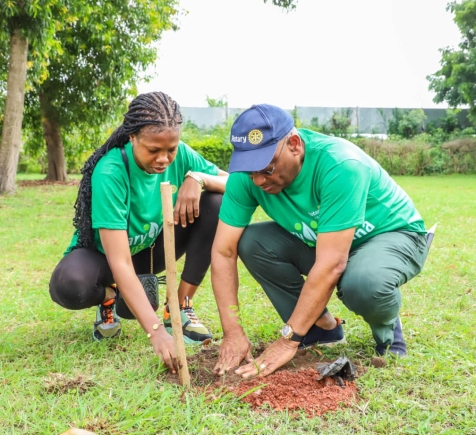By Benjamin Mensah
Accra, July 24, GNA – Rotary International District 9104, is teaming up with educational institutions in the country to enhance an initiative dubbed “Rotary Greens Ghana”, which was started last year.
The project aims to plant and sustain a minimum of 100,000 trees every year for the next three years.
During the period, all Rotary Clubs across the 16 regions of Ghana will be allocated seedlings and tasked to ensure they grow; nurture and preserve the trees on a sustainable basis.
Over 100 Rotary and Rotaract Clubs would partner with various entities throughout the year to drive this environmental conservation effort across the country.
As part of activities to get more people in the exercise, the Rotary Club of Accra-Ring Road Central and the Rotaract Club of Accra-Ring Road Central have planted 300 trees at the University of Ghana Sport Directorate, at Legon.
Mr David Amankwaah Jnr, Governor for District 9104, said the initiative seeks to transform the idea and task of ‘greening’ the environment by planting trees from being just a physical activity to an ingrained social and behavioural change.
“I believe this change starts with all of us present here and especially our young people. One key proposal we want to put forward to embark on missions to our educational facilities and emphasize the need to be environmentally conscious and a practitioner,” Mr Amankwah said.
Mr Amankwah said Ghana was among the countries that was being left behind in achieving the targets set by the Paris Agreement of the COP 21 in 2015.
The Paris Agreement is a legally binding international treaty on climate change. It was adopted by 196 Parties at the UN Climate Change Conference (COP21) in Paris, France, on 12 December 2015. It came into force on 4th November 2016. Its overarching goal is to hold “the increase in the global average temperature to well below 2°C above pre-industrial levels” and pursue efforts “to limit the temperature increase to 1.5°C above pre-industrial levels.”

Mr Amankwah described the drive for a green economy as “no longer a concept of political discourse but an important corporate social responsibility.”
“The greening agenda introduces a new economic paradigm, one in which material wealth is not earned at the cost of growing environmental degradation, ecological destruction, and social disparities. There is mounting evidence that a transition to a green economy has sound economic and social justification,” he said.
Mr Amankwah extolled the gains for reducing emissions and called on large organisations within the Ghanaian economy who were grappling with zero carbon credits to get on board and champion the greening exercise to improve the lives of communities they operate in.
“Rotary is willing to partner with such organisations to realise this singular objective. Large organisations in the energy and oil and gas sectors will be brought on board to collaborate with D9104 on this initiative which will further reduce their carbon footprint and work towards reduced carbon emissions.
GNA